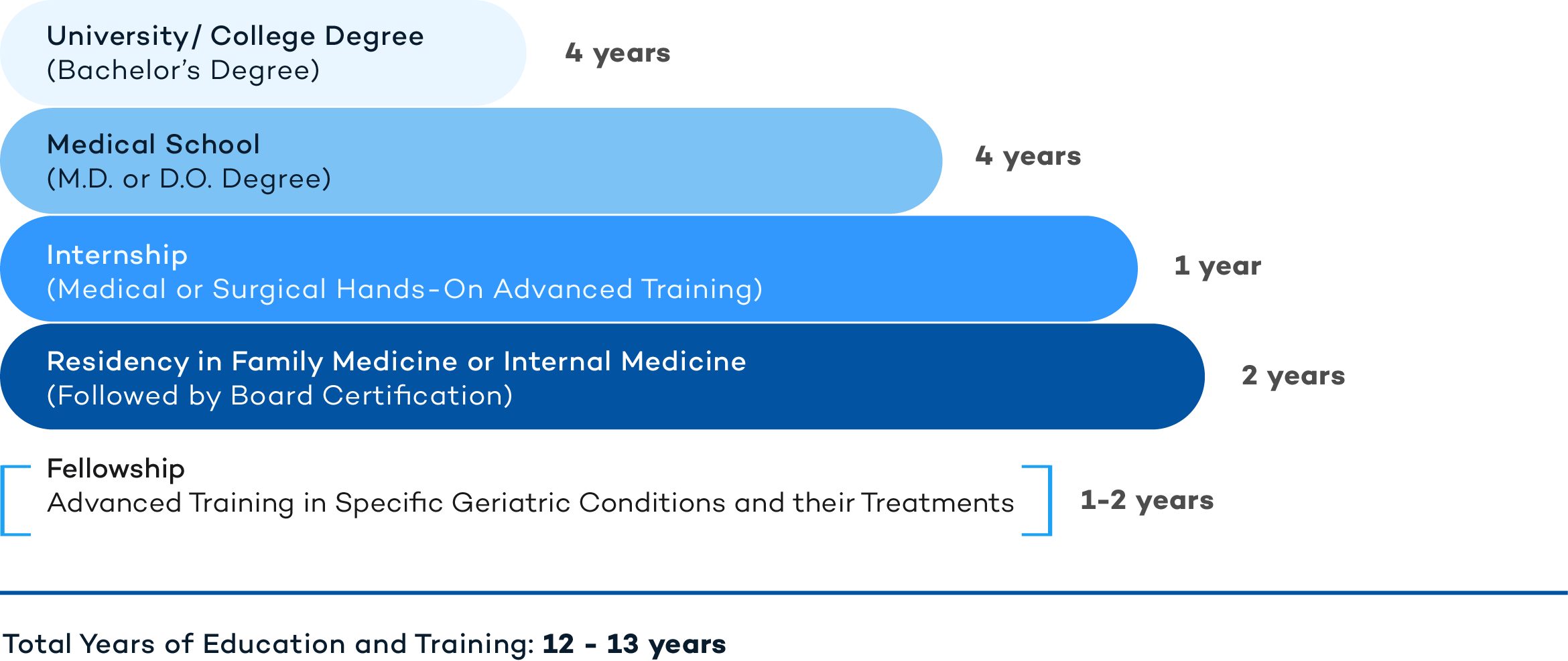

A Geriatrician is a Board-Certified Internal Medicine or Family Medicine Doctor who has received additional fellowship training that centers around diseases of the elderly. These physicians diagnose and treat many age-related conditions, and provide counseling to help manage and prevent certain health crises from occurring later in life. Some of the more important medical issues facing the elderly include hypertension (high blood pressure), hypercholesterolemia (high cholesterol), reduced bone density (osteoporosis), weight loss, hearing loss, vision impairment, and mood changes. The geriatrician also helps elderly patients maintain regular health screenings, including flu shots and colonoscopies.
Geriatric doctors are physicians (M.D. or D.O.) with advanced medical degrees and training. The following is a representation of the years of education and training that these physicians have undergone.

GERIATRICS from the Greek word ‘geron’ for ‘old man’ + and ‘IATREIA’ which means ‘the treatment of disease’.
A Geriatric Medicine Physician serves a critical role in the management of disease states in the elderly and in the prevention of serious age-related health issues. These physicians treat many conditions, including:
Dementia: Dementia refers to memory impairment that is significant enough to impact day-to-day functioning. Symptoms of dementia include memory loss, difficulty understanding, difficulty with speech, or confusion. The most common form of dementia is Alzheimer’s disease. Alzheimer’s disease is a progressive disorder where brain cells degenerate and die. Memory loss is the key symptom in Alzheimer’s disease with all patients showing varying degrees of memory lapse.
Osteoporosis: This condition occurs when the body loses too much bone, causing them to become weak and brittle. Although osteoporosis affects both men and women, postmenopausal women have the highest incidence rates. Symptoms of osteoporosis include loss of height over time, back pain, and easily broken bones. There is no cure for osteoporosis but treatments with oral or injectable bisphosphonate medications can help slow the breakdown of bone.
Incontinence: Urinary incontinence, or the leakage of urine, is more common in elderly patients. Incontinence may have a variety of causes including functional, cognitive, or mobility impairments.
Hearing/Vision Loss: Hearing and vision loss are particularly common in elderly adults. There are numerous anatomical changes in the ear and eye that occur with aging which contribute to these pathologies. With our ears, there is an increase in wax buildup, a stiffening of the eardrum, and a growth in cartilage. All of these changes lead to hearing loss and increased difficulty with auditory processing. Common eye disorders in the elderly include macular degeneration, cataract formation, diabetic retinopathy, and glaucoma.
Osteoarthritis: This term refers to the most common age-related arthritic joint disease. Osteoarthritis most frequently affects the hands, knees, and hips. It affects more than 80% of people over the age of 55 and causes pain, stiffness, and sometimes swelling.
Insomnia: More than 50% of elderly patients experience sleep disturbances like insomnia. Certain medical conditions or medications may play a role in the underlying cause. Lack of exercise, lack of social engagement, and stress may also predispose elderly patients to insomnia.
Depression: This is a mental and emotional disorder that commonly affects elderly patients. Causes of depression in the elderly include a family history of depression, traumatic life events, and low serotonin levels. Depressive symptoms may be exacerbated by limited mobility, isolation from family or friends, facing someone’s own mortality, financial hardships, or with the death of loved ones. Depression may cause actual physical pain that cannot be explained by other medical conditions.
Heart Failure: Heart failure may develop with age, as the heart becomes too weak to pump sufficient blood throughout the body. Congestive heart failure may result when the heart is weakened and blood and fluid back up, leading to swollen ankles and legs, as well as to fluid in the lungs. Shortness of breath, chronic fatigue, light-headedness, nausea, swelling of the lower extremities, and an elevated heart rate may be signs of heart muscle failure.
Balance Issues: Gait and balance disorders are common and are a major contributing factor to falls in the elderly. The most common causes of imbalance include arthritis, hypotension (low blood pressure), changes in gait with age, or changes related to underlying medical issues such as diabetes, peripheral arterial disease, neuropathy, dementia, and stroke.
Geriatric Medicine Physicians provide comprehensive medical guidance for elderly individuals and coordinate their care with a variety of subspecialty physicians. Often these patients have complex medical conditions and/or social issues that need to be addressed by a team of professionals. Older patients may have different patterns of disease presentation as well. Geriatricians are aging specialists who direct this team care approach to preserve an individual’s independence and quality of life as they age.
You can read more about Geriatric Medicine in the following links:
https://www.americangeriatrics.org/geriatrics-profession
https://www.geron.org
https://www.aafp.org/afp/topicmodules/viewTopicModule.htm?topicModuleld=55